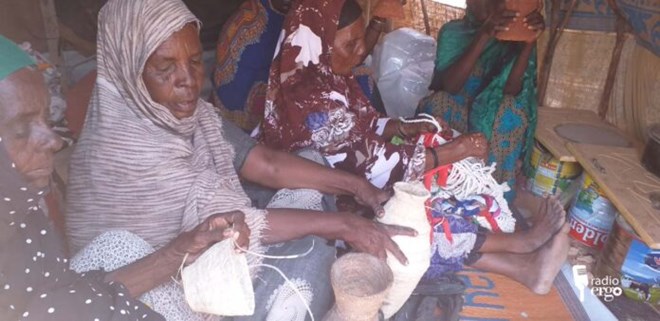
Thursday October 3, 2019

At the age of 80, Somali grandmother Fadumo Shire Beereed is the sole income earner for her displaced family of 12 people, living in Sahan camp in southern Galkayo, Galmudug region.
A pastoralist from rural Galinsoor, Fadumo experienced the loss of her family’s 300 goats and their entire livelihood during two years of drought from 2015 to 2017.
Forced to live in this IDP camp, which lacks even basic amenities, the old woman resorted to the skills she learnt as a girl by making and selling camel blankets.
It takes her a week to make one blanket, made out of cloth remnants she gets for free from a local tailor’s.
“We don’t take a break from this work as it is our only source of living,” Fadumo told Radio Ergo.
The blankets are put on a camel’s back before loading.
But times are hard for everyone because of the drought and as the local pastoralists are now so poor, it can take time for Fadumo to make a sale at $30-40 for one carefully stitched blanket.
She often has to buy food on credit whilst waiting for a sale. She says she misses her old life as a pastoralist, which cannot compare to life in the camp.
“I don’t really have the stamina required for the work, but I am forced to do it as I don’t want to beg or steal to feed my orphan grandchildren,” she added.Another grandmother, 78-year-old Hawo Abdi Abdile, earns a living for her family in nearby Doha-Mudug camp by making and selling Somali milk containers.
She goes out before dawn every day to harvest branches from the Qabo tree to make the milk containers. At the same time she climbs the hills to gather myrrh, which she sells daily at 30,000 Somali shillings per quarter to buy food for the family of six.
It takes two weeks to handcraft one milk container that sells for $20.
“I am from the countryside and I knew this skill before, it is not something I learnt now,” said Hawo, who comes from Dagaari, 30 km away.
“I decided to make use of my skill instead of sitting around doing nothing. So that is how I came to do this work, which helps me pay my debts and get my daily survival.”
Hawo’s family lost their two herds of goats to drought in early 2017 and they have no other income.
She has to hustle to make a sale in the market, as those buying her milk containers often ask for credit because they lack cash.
“For me, I ask them to give me the money on the spot because I have kids who depend on me,” she said.
Yet, despite the hardships, there is a sense of community in the camp.
“When we think there won’t be enough, we ask what each one of us has and we cook it together so that no one sleeps hungry and we are thankful to God for that,” Hawo said.
Muhyadiin Yusuf Samatar, community affairs director for Galkayo district, told Radio Ergo that the two camps are home to over 500 families. They have no health centre or school and are not served by any NGOs. Water costs 2,000 Somali shillings for 20 litres at the camp’s only tap.